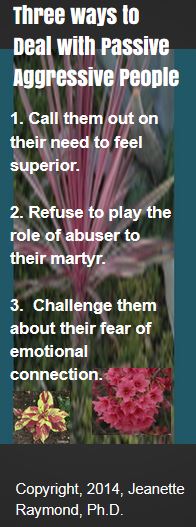Anger and Stress Management Tips for Satisfying Relationships by Dr. Jeanette Raymond, Ph.D.
Don’t you just grit your teeth and want to tear your hair out with fury when your loved ones pretend they are not angry or upset, yet make snide remarks?
Don’t you feel that they are trying to be better than you, by trying to be in full control of their anger, only to let it out in far more cruel ways?
Aren’t you longing to get them to show their rage and be equally human with you?
If so then you want to have a more authentic and intimate relationship, which involves being open and upfront with your emotions, including anger.
Loved ones who use passive aggressiveness to handle their feelings are afraid of emotionally intimacy.
- They would rather withdraw and poke you from afar so that they can shield themselves from the impact they have on you, and vice versa.
- They prefer to take what they believe is the moral high ground, so that they can feel superior. Putting themselves on top is a way of avoiding emotional closeness.
- They get a kick out of playing the martyr role and force you to become the abuser who is harming them.
Why live in a place of frustration? All it does is bring you stress and cause you to hate your loved ones. You have more fights and battles about who is the better person or who is the most honest.
You can’t make a martyr change with your anger or revengefull thoughts. Nor can you compete with them for martyrdom!
What you can do is to make them look in the mirror and show them how they care more about:
- being superior than having a strong connection with you
- being safe behind the walls of martyrdom than taking the risk of learning how to be emotionally intimate and strong simultaneously
- seeing you as the monster so they can feel good about themselves.
Copyright, Jeanette Raymond, Ph.D.
You might also like:
Avoid the pain of losing loved ones becasue of anger issues
How to be equal partners in your marriage
Dealing with anger when you feel emotionally blackmailed
Disclaimer: this article is for informational and educative purposes only. Dr. Raymond is not responsible for any reactions you may have when reading the content or using the suggestions therein. Interacting with this material does not constitute a therapeutic relationship with Dr. Jeanette Raymond

